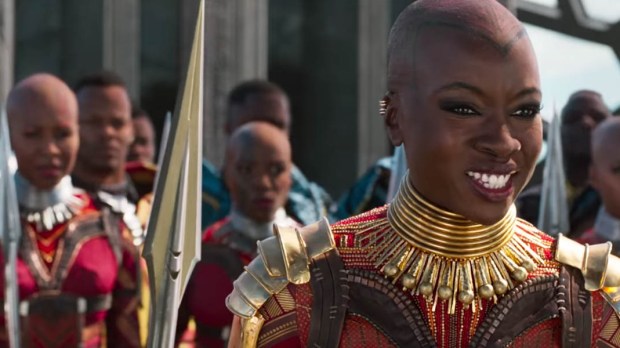The Black Panther has always been cool. Introduced in 1966 as the super-heroic prince of the technologically advanced African kingdom of Wakanda, the Black Panther would go on to prove himself to be one of the smartest, most capable of men in the Marvel universe. He can hold his own in combat against Captain America, occasionally out-think Iron Man, and has a mythology as deep and complex as Thor’s. He’s just cool. And now, as befitting such a cool character, Black Panther has a pretty cool movie to call his own, just like all those other heroes.
Speaking of which, it seems Marvel Studios just assumes audiences have watched all those films and committed them to memory. As such, Black Panther begins with little mention of the character’s appearance in 2016’s Captain America: Civil War. It takes for granted that moviegoers will recall how Prince T’Challa’s father was murdered while attending a conference in Vienna, forcing T’Challa (Chadwick Boseman) to take on the royal mantle and powers of the Black Panther. It even expects everyone to remember that American agent Everett K. Ross (Martin Freeman) was there to witness the whole thing.
Instead of such a recap, Black Panther jumps right into its own story. Though already recognized as king by most of his subjects, T’Challa must go through his country’s traditional ceremonies to lay final claim to his birthright. This includes facing any challenger in ritual combat, the only one of which eventually comes in the form of M’Baku (Winston Duke), chieftain of the ape-worshiping Jabari tribe. The two would-be kings face each other atop a waterfall while the Dora Milaje, Wakanda’s fearsome all-female special forces, prevent any interference or escape.
While this is going on, a much more dangerous threat is arising outside the holographic dome that allows Wakanda to remain secreted away from the rest of the world. For his own reasons, the rogue black-ops soldier Killmonger (Michael B. Jordan) has his own aspirations to the throne, and has enlisted the aid of the criminal Ulysses Klaue (Andy Serkis) to help him sneak into the hidden kingdom. Viewers will, of course, remember everything there is to know about Klaue from his appearance in 2015’s Avengers: Age of Ultron, including how he lost his arm and has now replaced it with a robotic limb that emits sound blasts. Or maybe not.
In addition to those players, Black Panther has a plethora of supporting characters running around. Angela Bassett plays T’Challa’s mother, Forest Whitaker fills the role of his uncle and advisor, Letitia Wright is his super-scientist sister, Lupita Nyong’o features as his former lover and most trusted spy, and Danai Gurira appears as the no-nonsense leader of the aforementioned Dora Milaje. The film could easily collapse into a messy roll call of who’s who in black cinema at this moment, but it doesn’t. The script deftly defines each character and makes them essential to the story. It also goes without saying that the actors are excellent. Gurira, in particular, steals every moment she appears on screen.
Still, you can get exciting super-heroics and good acting in most Marvel movies these days. What makes Black Panther stand out is that the story has a bit of depth to it as well. Given the early chatter surrounding the film, combined with the fact that the character was created during the 60s and given the rather provocative name of Black Panther, it would be easy to assume the film would be racially charged. That’s not really the case, though. In fact, the very existence of white people is kind of dismissed by the people of Wakanda in one eye roll.
No, what Black Panther has more on its mind is the divide between those with means and those without. You see, Wakanda is portrayed as a utopia of sorts, a technological Wonderland with no poverty, little crime, clean energy, and a generally happy populace. Such bliss, however, comes at the price of isolating itself from the rest of humanity. Wakanda hasn’t just turned away European colonizers over the centuries, it has turned away everyone, even those it could easily help.
This doesn’t sit well with Killmonger, nor should it. Anyone with a basic understanding of Catholic social teaching, or just plain human decency for that matter, can tell you that society’s institutions have a responsibility to seek the common good and well-being of all. So, oddly enough, even as we cheer for T’Challa and his crew, we also agree with at least some (though certainly not all) of the bad guy’s motivations. This results in Killmonger becoming one of the most involving villains Marvel has put on film to date. But that’s just another thing that makes the Black Panther so cool, isn’t it? Even his villains are interesting.

